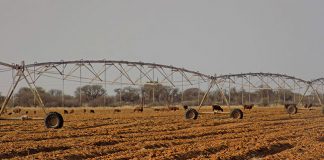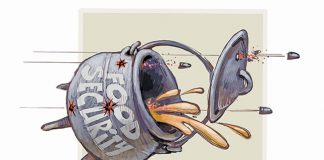
South Africa’s commercial farmers seem deeply concerned and even brow-beaten about current and proposed government land and labour legislation affecting the agricultural sector. The message I have for you all is one of optimism, because I believe completely and utterly that, at the end of the day, the voice of reason will prevail. I premise my belief on the tenets of the Constitution.
Many years ago when we, as organised agriculture, visited you for the first time in this province, we shared the same point of departure with you during the debate at the time on our future as commercial farmers in this country. The Constitution, supported by economic reality, provides a framework for meaningful debate on the future of South Africa and its people. And no one is going to move those who believe in constitutionalism and are supported by these economic arguments.
We will not be moved one inch towards the creation of an economic desert in our country. There is enough goodwill among South Africans for us to be able to address the challenges we face, without having to go the ruinous route of Zimbabwe. I implore you to lift up your heads because you, as commercial farmers, should be the most powerful lobby group in our country. You produce and you sustain this nation. Despite this, you continue to underestimate your importance and position in our country, even starting to believe what the politicians are telling you.
It reminds me of that famous political speech Dr Frederik van Zyl Slabbert made in 1986 in the Houses of Parliament before he left in desperation because people did not want to listen to the voice of reason. He said the parliament of the time was an ineffective instrument for change. We appear to have the same impasse today. Within the structures of the ANC, there are people with divergent political convictions sharing the same political platform. They’re at loggerheads because socialists, communists, free-marketeers and capitalists struggle to formulate a point of departure.
Within organised agriculture we have, long ago, put the racial debate to bed. If there are commercial farmers who are still racially inclined they must know that they’ve lost from the start if they premise their opinions with racist statements. We have a non-racial, inclusive democracy and we will see to it that, together with other moderately opinionated South Africans, we can further the debate on an economically sustainable future and our constitutional rights as individuals.
Bizos on the constitution
We base this on a letter that we received from advocate George Bizos, who defended Nelson Mandela at the Rivonia Treason Trial. As a constitutionalist, Bizos is a best friend to us all. This is what he wrote:
“Free State Agriculture has asked me to advise them on the legal position in relation to the protection, acquisition, expropriation, evaluation and use of land. There is a political debate raging between at least two different groups that both refer to the Constitution. The one group blames the Constitution for providing for the refunding of redistributed land to the previously disadvantaged at market value.
The other group claims that the Constitution may be amended to enable the South African government to follow the path of President Mugabe of Zimbabwe to seize the land without compensation. The former are calling for an amendment to the Constitution that says that land ownership should only be changed on the basis of a willing seller/willing buyer at an agreed price.”
Advocate Bizos then clearly states what is in clauses 25 and 36 of the Constitution. He closes the letter by saying in reference to these: “The above provisions clearly protect the owners of land against arbitrary seizures. The Constitutional Court certified the Constitution, including the above sections, as compliant with the 34 democratic principles agreed to at Codesa (Convention for a Democratic South Africa).
“Although the provisions of the Constitution may be amended by a two-thirds majority, it is most unlikely that any such attempt will be made. It may be argued that the preamble to the Constitution, read with Section 36, prevents amendments that will nullify the Constitution’s founding principles.”
Some gains
Organised agriculture’s argument regarding this debate is founded on these facts. In the Nareg (National Reference Group) process, of course, there have been divergent opinions. However, the final outcome of negotiations on proposed land ownership caps between government and organised agriculture turned out in the best interests of all people in South Africa, and the fact that land ownership caps are no longer being considered is a victory for all involved in the debate around this issue.
This is because any simplistic approach to land caps per se would undermine the food security of this country irrevocably.
The producers of maize in South Africa subsidise the consumers of maize in South Africa to the tune of R1 500/t because we produce a maize surplus that is exported. If that surplus disappeared, the local maize price would immediately increase by R1 500/t. By virtue of the fact that the maize industry is the largest agricultural industry in South Africa, other industries that consume maize would be negatively affected.
Inclusive policies
What we need is a debate that understands the reality that in the vicinity of 54% of our commercial farmers are not VAT-registered and therefore do not have turnovers greater than R300 000. We need to return –
and I say this despite the fact that many in the ANC find it offensive – to the inclusive approach of former president Nelson Mandela. Had we stuck to this model, we would, by virtue of co-operation, have been much further down the road with all the challenges that face us in agriculture, and specifically with land reform. We need to admit that the Native Land Act of 1913 denied the majority of South Africans a fair opportunity. And we need to redress those realities.
We need a holistic approach to the tariff policies applied by the International Trade Administration Commission of SA. Our poultry industry is now addressing concerns about current tariffs on imported chicken. For every kilogram of chicken that we import, we lose jobs – 750 000t of imported chicken is the last figure I have.
For every kilogram of chicken that we import we are, in fact, denying someone here an opportunity to produce two kilograms of maize. We need a realistic approach to our future, and to the sustainability and profitability of commodity production in South Africa. If we are serious about addressing the plight of the poor in the rural areas, which, in actual fact, only agriculture can address, then we need these debates to take place sooner rather than later.
Obsession with race
But the reality is that within government there are people who think in terms of race. These people should urgently come to understand that the subject of race makes no difference anymore. The messages that we, as organised agriculture, convey to white farmers and black farmers do not differ between the two groups. We need a non-racial approach to debates in the interest of all of us.
I will not be subjugated ever again by any government. I will defend my civil liberties and I will serve to uphold the Constitution. If we all did this, South Africa would be a far better place in which to live.It is time that farming communities across the colour line become party to organised agriculture bodies.
Farmers’ support is critical
The voice of reason, both constitutionally and economically, will prevail because we are going to get so damn difficult about our reasonableness that no one is going to dare to take us on as to that fact. With the support of our farmers, organised agriculture will be able to achieve the voice of reason within the debate about our collective future. If you want your children to hold you accountable – every generation blames the one before, after all – by not accepting these challenges, your children will blame you, and rightly so.
Contact Louw Steytler via email [email protected]
The views expressed in our weekly opinion piece do not necessarily reflect those of Farmer’s Weekly.













